By Scott Bland
It has been about 16 months since I was approached about helping to put together a Construction Science program at the Greater Waco Advanced Manufacturing Academy (GWAMA). There has been an amazing the amount of progress that has been made since that time a year ago.
We have received approval from the Waco ISD school board to create the Construction Science program at GWAMA with the first classes starting in August of this year. The team of people tasked with getting the program off the ground has succeeded in receiving about $200,000.00 in cash and in kind donations from the private sector to help renovate the space at GWAMA and secure the necessary tools and supplies.
Most impressively, our team, in conjunction with the Texas Association of Builders and Representative Doc Anderson, has succeeded in proposing and passing state legislation that removes the liability insurance concern regarding businesses employing paid student interns while they are in the program. This is exciting not only for the Construction Service program, but it allows all the GWAMA programs to incorporate the paid internship model for its high performing students. Not to mention what this means to career and technical programs all over the state. In a legislative session that has seen a record number of vetoes and a special session, this was an amazing accomplishment.
I believe we are seeing a turn in the general public’s perception of technical and career education. We have ignored and stigmatized this segment of our educational system for so long, the workforce shortage has reached crisis levels. This has resulted in ever increasing costs of both residential and commercial construction. The trickle down effect means the costs of housing and essentially all goods and services go up as a result to offset those costs.
The field of construction has seen a dramatic change as well. Building a home or commercial building is no longer as simple as putting up four walls and a roof. Advancements in technology mean that we can now build structures that are extremely energy efficient and wired into all the current digital demands and capable of advancing into the future with the changing technical capabilities. This means that not only do we need more workers in construction; we need highly educated workers in the workforce.
This means that our construction workforce must be better educated than ever before. The Construction Science program is the gateway to introducing our young students to a dynamic and ever changing industry that is as challenging and rewarding as any industry in our country. Our program is designed to direct students into post-graduate certification and degree programs with the background they need to be successful.
While attitudes towards jobs in the trades are seeing a dramatic turn-around, we need another common belief to begin to change as well. With the high cost of secondary education going even higher every year, the concept of the 4-year degree needs to be re-evaluated. With the senior year paid internship allowing our students to develop relationships with employers in the construction industry, it should be an easy transition from high school to advanced education while continuing to earn a wage. The shortage of qualified workers provides a strong incentive for companies in the industry to work with a young student’s work and school schedule, giving the student an opportunity to earn that advanced certification or degree without student loans.
However, working while learning comes with a cost in terms of time. Instead of thinking along the line of a traditional 2-year advanced certification or 4 year degree program, students (and their parents) should be thinking along the lines of a 4 or 6 year educational term. It should be obvious that a debt-free 6 or 7 year degree is much preferable to a 4 year degree and $150,000.00 worth of student loans.
In just a little over a year we have created a program from scratch and succeeded in passing legislation in the process. We have raised more money than the cost of a typical college degree in that time as well and seen attitudes and opinions regarding career and technical education finally begin to change. In August we will see our first students begin the journey towards changing their lives and our industry for the better.
For more information about the Construction Sciences Program, visit the website or contact Donna McKethan, Director of Career and Technical Education. Her email address is [email protected].
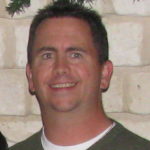 Scott Bland was born and raised in Waco. He is an alumnus of Baylor University. He worked for Highland Homes in the Dallas area from 1998 to 2001, then joined the United States Secret Service as a Special Agent after the 9/11 attacks. He retired his commission in late 2006 to return to Waco and take over the family business, Jim Bland Construction, where he has served as Owner and President of the company for the last 10 years. He is currently the President of the Heart of Texas Builder’s Association as well as a member of the Board of Directors for the Greater Waco Chamber of Commerce.
Scott Bland was born and raised in Waco. He is an alumnus of Baylor University. He worked for Highland Homes in the Dallas area from 1998 to 2001, then joined the United States Secret Service as a Special Agent after the 9/11 attacks. He retired his commission in late 2006 to return to Waco and take over the family business, Jim Bland Construction, where he has served as Owner and President of the company for the last 10 years. He is currently the President of the Heart of Texas Builder’s Association as well as a member of the Board of Directors for the Greater Waco Chamber of Commerce.
The Act Locally Waco blog publishes posts with a connection to these aspirations for Waco. If you are interested in writing for the Act Locally Waco Blog, please email [email protected] for more information.
By Kathleen Geiger
Have you noticed that almost everything you buy comes with an owner’s manual? I recently bought a pasta maker and the manual was a 35-page detailed booklet describing the ways to use the equipment and what to do if I wanted a certain “noodle” outcome. In contrast, when we have children there is absolutely no manual, paperwork, leaflet, or website given that tells us how to parent in a way that would enable our children to have a particular outcome. So it’s tough, trying to figure out how to parent when there are so many opinions about what is right and wrong. When asked what we hope for our children, what we want the outcome to be, most parents say they want their children to be happy, healthy, and a functional member of society. But how does that happen?
I believe the healthiest parenting model is one which recognizes the critical importance of the parent-child relationship. The way you relate to your child now sets them up for how they will relate to others in the future. And how we relate to others has everything to do with being happy, healthy and a functional member of society. The way we develop and maintain relationships has to come from somewhere. Who do children spend the most time with during their development? Us! The parent or major caregiver. Through your relationship with your child, you teach them how to relate to teachers, family, and friends. Telling your child how to relate appropriately does very little, but YOU relating to your child, being relational, has everything to do with what his/her future relationships will look like.
A relational parenting approach is one which focuses on the critical importance of the parent-child relationship. It means having a deep desire to be closely connected to your child. Your strength as a parent lies in the relationship. Children who are deeply connected have less behavioral difficulties, less academic failures, and are significantly less involved in substance abuse and sexual risk-taking.
The brain is a social organ—that is, it is constructed and built through experience. From the moment we are born, we begin taking in the world around us. What we experience becomes a reference for how the world works together. Humans have a biological NEED for closeness. Being close to your child may be the most important tool you have for ensuring your child’s overall development. So what are the components of relational parenting?
Developing a Bond – A bond is the connection formed between two people. A bond happens, when over time, parents show a desire to listen to their child’s thoughts and feelings. It means listening more than talking. It means being actively involved. It means having uninterrupted time together. Bonding requires focus and intention. When parents and children are actively engaged the potential for strong connection is powerful. Together parents and children create intimacy – literally, as my grandmother would say, “in-to-me-you-see.” Bonding is something we cultivate. Preoccupation with electronics is the opposite of close connection. There are times when your relationship in person is much more important than the on-line ones. Setting the limit so you can get close in the now means no cell phone, no computer, no Netflix, no Pinterest, no Facebook, no Instagram, no snapchat…at times when being together is more important. When parents desire to know their child’s thoughts, feelings, intentions, wishes, and worries, that child will feel valued and grow to have a strong sense of self-esteem. Together, this creates their ability to form strong relationships with others throughout life. Your child comes into the world wanting a relationship with you….literally needing and hungering for it. You as the parents are the ones that make the decision whether to foster a nurturing relationship.
Being a parent who “gets it” — “Getting it,” means being more concerned with how your child feels than how you feel. A desire to understand your child’s feelings through words, body language, and facial expressions helps you understand your child from the inside out. Being the mirror and reflecting back to your child what you are hearing is powerful. Showing empathy is also important. You can do this by thinking of a time when you felt the same feelings and sharing that experience with your child. You may not understand fully, but you can get close to understanding by seeing the world through their eyes. That doesn’t mean you are in agreement with everything your child thinks, it means that you better understand where your child is coming from – all important for good communication. That’s what being relational is all about!
Having their back – This includes being available, responsive, and reliable. Your child needs to know they can come to you for comfort and support under stress. Feeling safe within the family relationship allows children to take risks to become independent. There is no time when a child should be completely independent and manage things entirely on their own. They need you all along the way. Growing up happens incrementally. It takes many years of trial, error, and practice for children to develop the multitude of skills needed to live independently. An important skill that is sometimes overlooked in parenting is helping a child learn to manage their emotions – soothing sadness, calming down anger, slowing impulsivity, and managing fears and anxieties. Difficult emotions such as fear, anger, shame, and grief become less overwhelming when a child knows they have a secure person at home who will help them feel safe and “regulated” again.
Giving up the need to be “right” – You can win the battle and lose the war this way. Being right is about showing power, demanding your child have your viewpoint, and agreeing with everything you think. This leaves little room for your child to share their own feelings without being judged. Seeing your child’s view as valid does not again mean you are permissive; it means that you allow differences without feeling threatened as a parent. When a parent stops needing to be right, they are able to see the child’s behavior in a broader context. For example, misbehavior is oftentimes about something much bigger – something your child does not know how to communicate appropriately. Holding a respectful limit with your child (the discipline part) while desiring to understand the emotions behind the behavior (the relational part) is a top priority.
A relational parenting approach is your choice. It is hard. It takes time and thought. It takes a lot of energy- especially at the end of the day. But the payoff is huge. It is more fun. Your child wants to spend time with you throughout life. But, most importantly, it is this relationship that gives a child a sense of his/her self-worth, competence, lovability, value, and the ability to continue to have relationships with others and to be a happy adult. And, isn’t that what it’s all about?
Relational Parenting
- Affirm rather than criticize
- Nurture rather than neglect or abandon
- Set limits rather than indulge
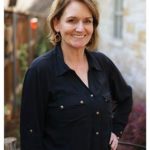 Kathleen Geiger has been licensed by the Texas Board of Licensed Professional Counselors since 1990 and has been in private practice in the Central Texas Area for close to 25 years. Kathleen has many areas of expertise and provides psychological services for individuals, children, adolescents, couples, and families. She works with children is play therapy and Cognitive Behavioral Therapy and enjoys working with teenagers, adults, and families in various methods of counseling practice. She is trained in Developmental Trauma work by Pia Mellody and has earned her certification as a Somatic Experiencing Practitioner. To learn more about Kathleen, her practice, or to contact her, please visit: www.kgeiger.com.
Kathleen Geiger has been licensed by the Texas Board of Licensed Professional Counselors since 1990 and has been in private practice in the Central Texas Area for close to 25 years. Kathleen has many areas of expertise and provides psychological services for individuals, children, adolescents, couples, and families. She works with children is play therapy and Cognitive Behavioral Therapy and enjoys working with teenagers, adults, and families in various methods of counseling practice. She is trained in Developmental Trauma work by Pia Mellody and has earned her certification as a Somatic Experiencing Practitioner. To learn more about Kathleen, her practice, or to contact her, please visit: www.kgeiger.com.
By Craig Nash
Through the No Kid Hungry Campaign of Share Our Strength, the Waco Regional office of Texas Hunger Initiative has had the benefit of two Baylor Students serving as Youth Ambassadors (YAs), charged with the task of providing support for and increasing participation in the Summer Food Service Program. This summer’s YAs are Keyanna Taylor from San Antonio and Steven Kuipers from Reading, Pennsylvania. Both Keyanna and Steven have hit the ground running and are providing tons of creative energy to summer meal sites. I wanted them to have an opportunity to share with the Act Locally Waco community about themselves and what they are learning this summer.
—
Keyanna Taylor
 My name is Keyanna Taylor. I am from San Antonio, Texas, and a sophomore at Baylor University studying Public Health on the Pre-Medical track. I am passionate about learning how hunger and overall poverty impacts the health of communities and the individuals that make up these communities. I love being a part of the Texas Hunger Initiative and Share our Strength’s No Kid Hungry Campaign, because it allows me to make a difference towards improving the health of children, adults, and whole communities from a unique angle.
My name is Keyanna Taylor. I am from San Antonio, Texas, and a sophomore at Baylor University studying Public Health on the Pre-Medical track. I am passionate about learning how hunger and overall poverty impacts the health of communities and the individuals that make up these communities. I love being a part of the Texas Hunger Initiative and Share our Strength’s No Kid Hungry Campaign, because it allows me to make a difference towards improving the health of children, adults, and whole communities from a unique angle.
Since being a Youth Ambassador, I have been exposed to a lot of different parts of Waco, and I have learned about many different organizations and efforts that work for the community. It has been so eye opening to truly see how big and diverse Waco actually is. Before this experience, I thought it was a tiny town with not much going on. But I have learned that it is very large and active. This intrigued me and made me even more excited about my role this summer, because now I feel a calling to give back to this community.
More specifically, we recently visited the YMCA of Central Texas to see what its meal sites look like and to propose implementing some of the programs Steven and I are creating to increase meal site attendance. While visiting the YMCA, I got to see how many kids participate in the different camps and programs over the summer, and I was amazed. I was surprised to see how many kids they have in different summer camp programs, and it got me thinking. Would these children make it to meal sites if it weren’t for these programs here? Would they still be involved in physically and mentally engaging activities without the YMCA? This stood out to me as interesting and formed a connection in my thinking of how summer meal sites work alongside other organizations to impact the overall health of children. The children in these programs have access to healthy breakfast and lunch. They have access to games and activities that keep their minds stimulated, and they are being physically active to also keep their bodies healthy. I now see hunger being directly related to the holistic health of individuals.
After this experience at the YMCA, I realized how excited I was to be doing this work with the Texas Hunger Initiative. It is a way for me to explore the connections between hunger and mental and physical health of individuals and their communities. I would like to encourage others in the community to actively seek out ways they can learn more about different organizations in Waco. I believe that efforts from all different avenues must work alongside each other to improve the health of all citizens. So whether it be volunteering at the YMCA, Caritas of Waco or visiting a summer meal site, there are many ways to improve the health and quality of life for all here in Waco.
—
 Steven Kuipers
Steven Kuipers
Hello! My name is Steven Kuipers, and I am from Reading, Pennsylvania. Currently my studies revolve around Economics, Chinese, and Religion during my time as a student at Baylor University. I am also a community leader at Arbors apartments and a proud member of the Baylor Men’s Choir!
This summer I had the opportunity to travel with the Men’s Choir to sing and minister in Kenya. While there, I was taught a valuable lesson that I hope to bring to my work here in Waco. I learned it after we finished serving in the Pokot Village: a remote area about seven hours from Nairobi. Immediately after we arrived, we worked tirelessly to improve the living condition for the people there; we built water irrigation systems, painted classrooms, planted gardens, and even opened a medical clinic to treat the ill and infected. For nine hours, we served until the sun set and it was time to go home.
During our dinner at the hotel, we shared some of our feelings about the day. Surprisingly, there was a common feeling among the group: a sense of helplessness. We felt that even after all the time we spent working, we didn’t even scratch the surface of the problems there: hunger, illness, and poverty were still going to be present in the village after we left. After hearing this, our choir director stood up and gave us some encouragement. He explained to us that attacking something as big as third-world poverty could not be done in a single move. He explained that this kind of thing takes time and consistency, and that we did our part faithfully. He concluded by saying, “You cannot do everything, but you can do something.”
Those words resonated with me as I thought about my work here this summer addressing hunger. A lot of hunger in our community stems from the multi-rooted tree of poverty, and trying to chop down the tree by myself is an impossible goal. That is why it is not my responsibility to obliterate poverty in its entirety because, “I cannot do everything. But I can do something.” For me, my “something” is addressing hunger. I find great contentment in doing my part here at the Texas Hunger Initiative, because I realize that my work is part of a bigger picture of our community effort. Our organization focusing on hunger allows other groups and organizations in Waco to specialize in their own areas. And everyone chipping in to do their part will be the effort that makes a serious impact on our city.
That is why I want to encourage you, the reader, that when you want help your community, you alone don’t have to take down poverty. All you have to do is something. It can be anything, big or small, to address the cause. And when we have a community that collectively chips in to do its part: serious change happens in our lives and in our communities.
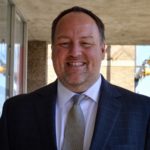 Craig Nash has lived in Waco since 2000. Since then he has worked at Baylor, been a seminary student, managed a hotel restaurant, been the “Barnes and Noble guy,” pastored a church and once again works for Baylor through the Texas Hunger Initiative. He lives with his dog Jane, religiously re-watches the same 4 series on Netflix over and over again, and considers himself an amateur country music historian.
Craig Nash has lived in Waco since 2000. Since then he has worked at Baylor, been a seminary student, managed a hotel restaurant, been the “Barnes and Noble guy,” pastored a church and once again works for Baylor through the Texas Hunger Initiative. He lives with his dog Jane, religiously re-watches the same 4 series on Netflix over and over again, and considers himself an amateur country music historian.
The Act Locally Waco blog publishes posts with a connection to these aspirations for Waco. If you are interested in writing for the Act Locally Waco Blog, please email [email protected] for more information.
By Trey Crumpton
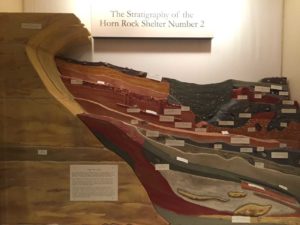 Did you know that people have always loved living in Central Texas?…and I mean ALLLWAAAYS! There are archaeological sites in the Waco area which appear to have been continuously occupied by humans for at least 12,000 years. One of those is a rock shelter on the banks of the Brazos River in Bosque County. Naturally carved out of bedrock by the river, the Horn Rock Shelter contained one of the most completely preserved records of human habitation ever discovered. From roughly 1966 to 1989, avocational archaeologists and locals Frank Watt, Al Redder, Robert Forrester, and L. T. Francis accomplished the huge task of excavating and mapping the site.
Did you know that people have always loved living in Central Texas?…and I mean ALLLWAAAYS! There are archaeological sites in the Waco area which appear to have been continuously occupied by humans for at least 12,000 years. One of those is a rock shelter on the banks of the Brazos River in Bosque County. Naturally carved out of bedrock by the river, the Horn Rock Shelter contained one of the most completely preserved records of human habitation ever discovered. From roughly 1966 to 1989, avocational archaeologists and locals Frank Watt, Al Redder, Robert Forrester, and L. T. Francis accomplished the huge task of excavating and mapping the site.
The Smithsonian has taken a keen interest in artifacts associated with two skeletons found at the site, and much of the material is now under the care of the Division of Physical Anthropology in Washington, D.C. The burial of an adult male and a teenage girl appear to be some of the oldest documented remains in North America.
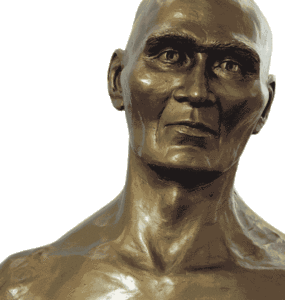 For a worthwhile daytrip out of Waco, visit the Bosque Museum in Clifton. They have a great exhibit on the Horn Shelter, and also focus on the vibrant Norwegian settlement and heritage in this area. This facial reconstruction (see picture at left), displayed at the Bosque Museum, was derived from a reproduction of the adult male’s skull discovered at the Horn Shelter by Al Redder and Frank Watt in 1970. Examination of features of the skull establish that the Horn Shelter Man could not be related to the American Indians. A date has been determined for the site of approximately 11,200 calendar years ago. This makes the adult male skeleton found at the Horn Shelter the first known inhabitant of Bosque County.
For a worthwhile daytrip out of Waco, visit the Bosque Museum in Clifton. They have a great exhibit on the Horn Shelter, and also focus on the vibrant Norwegian settlement and heritage in this area. This facial reconstruction (see picture at left), displayed at the Bosque Museum, was derived from a reproduction of the adult male’s skull discovered at the Horn Shelter by Al Redder and Frank Watt in 1970. Examination of features of the skull establish that the Horn Shelter Man could not be related to the American Indians. A date has been determined for the site of approximately 11,200 calendar years ago. This makes the adult male skeleton found at the Horn Shelter the first known inhabitant of Bosque County.
Ongoing DNA analysis could reveal a lot about our collective history, and our assumptions about the first Americans. Artifacts from the site, including stone and bone tools, and human-modified remains of several animals, can tell us about the landscape before our memory. We learned through this excavation that giant armadillos roamed along with bison, beaver, deer, badger, coyote, hawk, and giant tortoises (yes, they lived here too—maybe not as big as the Galapagos ones, but still pretty huge). Humans hunted and used many parts of these animals to survive in their harsh environment.
Come visit the Mayborn Museum and the Bosque Museum to see artifacts from the Horn Shelter, and you might learn a little more about yourself!
 Trey Crumpton is Exhibits Manager for the Mayborn Museum Complex at Baylor University, where he has been on staff for 11 years. He has lived in Waco since 2001, is working on his Ph.D. in Leadership Studies, and has two energetic kids who help him discover. His beautiful wife Ashley is an early childhood educator, and together they are proponents of all things enriching and fun. Trey loves family, friends, the outdoors, the lake, pizza, good books, and good film.
Trey Crumpton is Exhibits Manager for the Mayborn Museum Complex at Baylor University, where he has been on staff for 11 years. He has lived in Waco since 2001, is working on his Ph.D. in Leadership Studies, and has two energetic kids who help him discover. His beautiful wife Ashley is an early childhood educator, and together they are proponents of all things enriching and fun. Trey loves family, friends, the outdoors, the lake, pizza, good books, and good film.
By Ashley Weaver, Director of the SmartBabies Initiative, Waco Foundation
In McLennan County, approximately 45% of women have their first child at age 21 or younger. Research tells us that children born to young mothers are at higher risk for low birth weight and infant mortality, have fewer skills and are less ready to enter kindergarten than their peers. They are also more likely to give birth as teens.
Waco Foundation is committed to improving quality of life for all McLennan County residents. In 2009, the Foundation’s Board of Trustees recognized a deep need to focus efforts on improving the community for our youngest residents, so they commissioned an early childhood study to better understand quality of life for children ages 0-3. The study found the average early childhood quality of life measured at 41.67% on a scale of 0 to 100 and was significantly lower than the average found in some neighborhoods. Those results, coupled with Waco Foundation’s goal to engage in more proactive and strategic grantmaking, laid the groundwork for the launch of the SmartBabies Initiative.
SmartBabies works to facilitate cross-sector collaboration with professionals who provide direct services to parents and families. Waco Foundation provides fiscal resources, staff time and neutral facilitation to ensure the success of this community-wide initiative. Many times, organizations have similar goals but lack the capacity to engage with each other because the work is vast and time is limited. SmartBabies is designed to bring these organizations together to collectively address early childhood quality of life.
One of the great things about our community is the willingness to participate in this type of collaboration. Often times, this means setting aside agendas to work on something that may not be in direct relation to an organization’s goals but will ultimately benefit the entire community. As a native of Waco, I was eager to be a part of this because I want to see change happen in my community for families and children — somewhat like LeBron James has been for Cleveland and basketball (if you’re not a basketball fan you can contact me for clarification). My work allows me to engage with the organizations that want to see real change happen, and early childhood is the best place to begin a successful trajectory for children in Waco.
Our community is in the perfect position for initiatives like SmartBabies. The size, willingness and commitment to see change from so many individuals and organizations are strengths we must continue to build on. While we are primed for this type of work, it’s important for everyone to understand the length of time it takes to fully understand the skillset needed to see the change we want. This is truly a marathon, not a sprint.
We’ve learned a great deal since we officially launched the SmartBabies Initiative in 2011. Through the extensive research we’ve conducted through partnerships with many local, state and national organizations, we’ve learned that preventing an unhealthy environment is the key to improving quality of life for our children. While this may not seem surprising, it confirms that we have to continue to look at a woman’s health and quality of life before she ever gets pregnant if we truly want to impact the life of her children. This means focusing on things that we may not have thought about initially, such as the importance of well-woman exams, access to affordable birth control for women
and families to plan their pregnancies and teen pregnancy prevention, to improve life for our children.
We’ve experienced many successes along the way, including collaboration with the Healthy Babies Coalition and the launch of Nurse Family Partnerships and Healthy Outcomes through Prevention and Early Support (HOPES). These partnerships serve as examples of how effective collaboration works for the benefit of our entire community. In fact, Nurse Family Partnership and HOPES will bring in $3 million of outside funding to the Waco community, specifically for the purpose of improving quality of life for our children. For women and families who are planning to become pregnant, are pregnant or have small children, I highly recommend looking into these programs for fantastic resources about raising children. You can visit their websites here:
Waco Foundation has also learned many lessons from the SmartBabies Initiative that will help us continue to best serve our community. Our Board and staff have developed a deeper understanding of our role as a strategic grantmaker. We now know the longevity necessary to see long-term success, and we’ve gained a better understanding of the pace of this type of work. As the community foundation for McLennan County, Waco Foundation believes this type of work is necessary to accomplish our mission. In addition, the Foundation has invested in Prosper Waco, which has helped us achieve continuous collaboration for the long-term. Our hope is to be able to replicate the SmartBabies model to address other pressing community challenges.
Waco Foundation’s SmartBabies Initiative is directly tied to long-term objectives and goals. The work is difficult as there is no exact prescription for how we can produce real change, but we’ve proven over the last few years that progress can be made when we focus our efforts as a community. I’m excited to see the continued impact of our work and am grateful to the Waco community for embodying the work of SmartBabies, so we can create meaningful change in the place we all call home.
 Ashley Weaver, a native Wacoan, brings to her position as Director of the SmartBabies Initiative extensive knowledge, background and passion. She holds a Bachelor of Science from Texas State University in Elementary Education as a certified teacher. She continued her education at Brown University where she received her Master of Arts in Urban Education Policy. Having served as project coordinator for the Greater Waco Community Education Alliance, Ashley gained valuable knowledge about the successes and challenges of this great community. She has extensive experience with community-based projects at a local and national level, bringing together stakeholders to achieve a goal. Ashley’s experience make her uniquely qualified for this most pressing position as we strive towards a community of SmartBabies.
Ashley Weaver, a native Wacoan, brings to her position as Director of the SmartBabies Initiative extensive knowledge, background and passion. She holds a Bachelor of Science from Texas State University in Elementary Education as a certified teacher. She continued her education at Brown University where she received her Master of Arts in Urban Education Policy. Having served as project coordinator for the Greater Waco Community Education Alliance, Ashley gained valuable knowledge about the successes and challenges of this great community. She has extensive experience with community-based projects at a local and national level, bringing together stakeholders to achieve a goal. Ashley’s experience make her uniquely qualified for this most pressing position as we strive towards a community of SmartBabies.
By Rachel E. Pate
Looking back on some of my fondest childhood memories of growing up in Waco, I can remember summers filled with family, fun and celebrations. It seemed like every summer we visited Indian Spring Park along the Brazos to partake in the fanfare of the Juneteenth festivities. The crowd would be filled with families from my church, neighborhood friends and citizens from throughout the community. I especially enjoyed the snow cones, cotton candy, soda pop, barbecue, talent shows and the variety of activities. As a kid, I can remember wondering, “This sure is fun, but why do we celebrate Juneteenth?” Through my childhood eyes it was simply a day for celebrating community and having fun, but I’d later learn that this sacred day of remembrance was quite more significant in our American history.
Juneteenth is the oldest known celebration commemorating the abolishment of slavery in the United States. Dating back to 1865, it was on June 19ththat the Union soldiers, led by Major General Gordon Granger, landed at Galveston, Texas. The troops brought news that the Civil War had ended and the slaves were now free. This was two and a half years after President Lincoln’s Emancipation Proclamation – which became official January 1, 1863. The Emancipation Proclamation had little impact on the enslaved Texans due to the minimal number of Union troops to enforce the new Executive Order, and in part due to the isolation of the state. However, with the surrender of General Lee in April of 1865, and the arrival of General Granger’s regiment, the forces were finally strong enough to influence and overcome the resistance.
A name for the celebration of June 19th was coined – “Juneteenth” – and the remembrance grew with more participation from former slaves and their descendants over the last century. The Juneteenth celebration is traditionally a time for reassuring each other, for praying and for gathering remaining family members. Juneteenth continues to be highly revered in Texas, and many of my own family members make an annual voyage back to Waco on this date every year.
As an adult, I have invested more time in learning exactly what Juneteenth means to me. It is an opportunity to rise above our beginnings, take pride in our heritage and move forward in the knowledge that it takes a community to enforce change. This year I’ll be celebrating with my extended family on Sunday the 18th at a private cookout in the park.
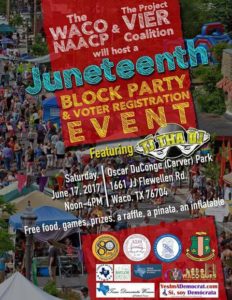 You can take part in Waco’s celebrations on Saturday, June 17:
You can take part in Waco’s celebrations on Saturday, June 17:
10th Annual Juneteenth Parade hosted by the Cen-Tex African American Chamber of Commerce – Saturday, June 17th, 10:00am-12:00pm (Parade route begins at Quinn Campus and will proceed along on Elm Avenue, ending at Indian Spring Park)
Juneteenth Block Party & Voter Registration Event hosted by the Waco NAACP and the Project Vier Coalition – Saturday, June 17th, 12:00pm-4:00pm at Oscar Duconge (Carver) Park- 1661 JJ Flewellen Road
 Rachel E. Pate is a native Wacoan and 1999 graduate of University High School. She currently works as the Public Relations person for the Cen-Tex African American Chamber of Commerce and serves as Coordinator for the Esther’s Closet program for women. She’s also a proud mom of one, lifelong member of Toliver Chapel (TCMBC) Church, lover of the great outdoors, avid sports fan and dedicated wearer of Converse’s Chuck Taylor shoes.
Rachel E. Pate is a native Wacoan and 1999 graduate of University High School. She currently works as the Public Relations person for the Cen-Tex African American Chamber of Commerce and serves as Coordinator for the Esther’s Closet program for women. She’s also a proud mom of one, lifelong member of Toliver Chapel (TCMBC) Church, lover of the great outdoors, avid sports fan and dedicated wearer of Converse’s Chuck Taylor shoes.
Historical Information Sources:
Website, Juneteenth.com – “History of Juneteenth”
By Karen Brown
AHEC or Area Health Education Center, has been a part of the Waco community and region for nearly 20 years, but what the heck is it? Area Health Education Centers were first proposed by the Carnegie Commission on Higher Education in the early 1970’s as a means of addressing the maldistribution of health professionals in medically underserved areas throughout the nation. Today, 56 AHEC programs with more than 240 centers operate in 49 states and the District of Columbia.
Texas AHEC East – Waco Region is a part of the Texas AHEC East Program which is run out of the University of Texas Medical Branch in Galveston, Texas. Together, our federally and state funded program, covers 111 counties and over 17 million people. Your local Waco Region is charged with 18 counties in the Heart of Texas. To quote Wikipedia, “AHECs are nonprofit organizations strategically located within designated regions where health care and health care education needs are not adequately met. An AHEC works within its region to make health care education (including residency and student rotations) locally available, on the premise that health care workers are likely to remain in an area where they train. An AHEC also works to support practicing professionals with continuing education programs and other support resources and to attract youth (particularly those from minority and medically underserved populations) to health care professions. An AHEC partners with community organizations and academic institutions to fulfill its mission.”
Why AHEC? Because in 2015:
- 35 Texas counties had no physician of any kind
- because 80 counties had five physicians or less
- because 185 counties had no general psychiatrist
- because the physician workforce is disproportionately located in the five most populous counties in the state
- because there are 438 designated Primary Care Health Professional Shortage Areas (HPSA) in Texas
- because in Texas, only 12% of Texas physicians identify as black or Hispanic
So what do we do?
- We help young people learn about and gain access to education to become their community’s health professionals.
- We provide real-life community educational experiences for health professions students.
- We facilitate recruitment and retention support for providers.
- We provide health career development education and training opportunities for health professionals
- We host community presentations to encourage healthy life styles.
- We assist communities in providing systemic change to address health inequity in their community
In short, we want to grow our own healthcare. It’s essential that our students know that we need them to be our future healthcare workforce. They need to know that we NEED primary care doctors, we NEED nurses, but there is also a place in healthcare for everyone. Below are just five of the many health care careers that can be completed in Waco in two years or less.
Certified Coding Specialist
- Coding specialists work in hospitals, health agencies, medical clinics and other facilities and process data for patient care, research and reimbursement purposes.
- 1 year certificate program
- Average Salary: $15/hr
Occupational Therapist Assistant
- Occupational therapy assistants and aides help patients develop, recover, and improve the skills needed for daily living and working.
- 2 year associate degree
- Average Salary: $50,000/yr
Respiratory Technician
- Respiratory therapists provide care for patients with lung disease or injuries that affect lung function.
- 2 year associate degree
- Average Salary: $54,000
Biomedical Equipment Technician
- Biomedical equipment technicians are responsible for all aspects of the installation and maintenance of biomedical equipment.
- 2 year associate degree
- Average Salary: $55,000
Community Health Worker
- As an individual who promotes health or nutrition within the community in which the individual resides
- 160 hour training
- Average Salary: $12/hr
We are thankful to our many community partners and supporters as we work toward “Making Our Communities Healthier.” It is because of our valued relationships within the community that make our programs successful! For more information, please visit: http://txaheceast.org/waco/
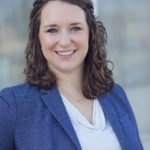 Karen Brown is the Center Director for Texas Area Health Education Center (AHEC) – Waco Region. She holds a BA from the University of North Carolina – Wilmington, and a MAEd. from East Carolina University. She serves on the Board of Directors for the Texas Rural Health Association and the Texas Society of Public Health Educators. Originally from North Carolina, she enjoys exploring all that Texas has to offer. You will often see her with her husband and son attending local community events and festivals, and she will be the first in line at Waco’s latest culinary addition. Karen may be reached at 254-753-4392 ext. 13 or email [email protected]
Karen Brown is the Center Director for Texas Area Health Education Center (AHEC) – Waco Region. She holds a BA from the University of North Carolina – Wilmington, and a MAEd. from East Carolina University. She serves on the Board of Directors for the Texas Rural Health Association and the Texas Society of Public Health Educators. Originally from North Carolina, she enjoys exploring all that Texas has to offer. You will often see her with her husband and son attending local community events and festivals, and she will be the first in line at Waco’s latest culinary addition. Karen may be reached at 254-753-4392 ext. 13 or email [email protected]
By Christina Helmick
One of the three main parts of the Prosper Waco mission is to help build an environment in which all members of our Waco community are able to improve their financial security. During our 2016 Annual Summit, Matt Meadors, President and CEO of the Greater Waco Chamber of Commerce, talked about upcoming collaborations and partnerships planned to help accomplish this part of the mission. One of those collaborations is now coming to fruition: Workforce Readiness Certification (WRC).
Local employers have reported for years that they need employees with good work readiness skills. The purpose of the WRC is to provide a certification that employers can trust to identify job candidates who have those important skills.
A development team including representatives from the Center for Occupational Research and Development (CORD), McLennan Community College (MCC) and the Greater Waco Chamber of Commerce (GWCC) began work on this project in January 2016. To make sure the certification would meet the need, the development team first met with a focus group of local employers to hear their top concerns regarding employee behavior and skill. The team also worked with the employers to collect specific, real-life case studies of situations in which workforce readiness skills would come into play at work.
The conversations with these employers were documented and that information was used to create a survey which was then emailed to 136 larger local employers. The results from this survey provided additional guidance for developing the certificate program. The development team then validated the findings with a follow-up meeting with employers.
Based on this work, the development team developed two certificate programs:
- Work Ethic: dependability, honesty and integrity, interest in working, commitment to improve, positive attitude & enthusiasm, and respect
- Being an Employee: attention to detail, taking ownership, listening and communication, meeting production goals, and teamwork
To obtain certification, cohorts of Job candidates participate in 24 hours of instruction (per certificate). The curriculum includes real-life scenarios directly from employers. One facilitator and six local employers will interact with each cohort group. Skill attainment is assessed through self-assessment, cohort assessment, facilitator assessment, and assessment by employers. Only those students whose cumulative assessment reaches a fixed level of proficiency are awarded a certificate.
For a full list of what the certification will include, please contact Dr. Richard Hinckley of CORD ([email protected]) and for a copy of the survey contact Frank Graves of McLennan Community College ([email protected]).
The first “pilot” cohort of WRC students will start later this month. Initial students will be selected by the Reintegration Roundtable (For more information about the Reintegration Roundtable contact Jamie Schmitt by email at [email protected]). The development team will use information collected from this group to fine-tune the curriculum before making it available community-wide.
Developing the Workforce Readiness Certificate was a collaborative effort. It could not have been done by one organization, but several organizations working together have developed a certificate program that will help our community build a better-prepared workforce. Through collaboration and partnerships, there are endless possibilities!
For more information about efforts like the WRC, please visit prosperwaco.org or call 254-741-0081.
 Christina Helmick is the director of communication at Prosper Waco. She is a recent graduate of Baylor University with a BA in Journalism, Public Relations & New Media. Originally she is from Washington, D.C., but has stayed in Waco post-graduation. She is an active mentor at J.H. Hines Elementary School, enjoys spending time with her family and watching Baylor football. Sic ’em Bears!
Christina Helmick is the director of communication at Prosper Waco. She is a recent graduate of Baylor University with a BA in Journalism, Public Relations & New Media. Originally she is from Washington, D.C., but has stayed in Waco post-graduation. She is an active mentor at J.H. Hines Elementary School, enjoys spending time with her family and watching Baylor football. Sic ’em Bears!
The Act Locally Waco blog publishes posts with a connection to these aspirations for Waco. If you are interested in writing for the Act Locally Waco Blog, please email [email protected] for more information.
by Estela Smith
I appreciate the efforts of the hard-working folks of Waco, especially those in the nonprofit realm. Many success stories prove that their hard work is paying off. Like in many communities, however, the need is great. The non-profit organizations cannot do everything on their own. Volunteers can help. I can help! Until recently, through Assistance League of Austin, I contributed my talents and energy, to volunteer in effort’s that served the local community…of Austin. Now my husband and I live in the Waco community and I want to contribute in this community.
I am a fan of Assistance League. I believe they make a difference, and I think it could be a benefit to start a chapter here in Waco. As the Waco area grows and becomes home to more folks, the need for additional services also increases. Assistance League could come alongside existing organizations to help serve the folks of McLennan County. Assistance League could help support the continuing effort to ‘make Waco a better place to live’ by recruiting and tapping the potential of volunteers to help those less fortunate to a better, more meaningful life.
Assistance League® is a national nonprofit organization, with 120 local chapters across the U.S. including Hawaii. It is a member based all volunteer organization. The purpose of each chapter of Assistance League is to meet the needs of the local community. They work through charitable giving programs helping one child, one young person, one senior, at a time.
For some members volunteering is their social connection. Some of us are recently retired or widowed and are now available to volunteer and explore new interests. We are busy volunteers, but we also enjoy each other’s company. As a member-volunteer in the Assistance League of Austin, I met and worked with several fascinating and very giving souls, both men and women, committed to the local community effort. The volunteers are from various backgrounds. Many, for example, are retired teachers. After having seen the positive effects of the Operation School Bell® Program as teachers, they now participate in the giving side of Assistance League.
Assistance League of Austin has been serving the community for the last 45 years. The chapter’s Toy Cart Program really held a special place for me. As a preemie, my own daughter had been in the hospital for an extended period of time. I always appreciated the solace of an encouraging nod and a small stuffed toy, for baby. Now, it is my turn to give a smile and a game or toy and a book to the patient and their family. Fact: The Toy Cart Program donates and delivers toys and books to more than 18,700 patients at children’s hospital every year! Besides toys, Assistance League volunteers provide pillowcases, embroidered blankets, and onesies for preemies at the children’s hospital in Austin.
Anne Banning founded National Assistance League® in 1935. It was the first nonprofit, nonpolitical, nonsectarian organization founded in the West to recognize the potential of volunteers in helping those less fortunate to a better, more meaningful life. We now have over 23,000 dedicated volunteers in 120 chapters nationwide (10 chapters in Texas). With 1.5 million individuals served, 3.2 million service hours and $38 million returned to local communities. We do make a difference!
The sustainable and charitable giving programs of the Assistance League are powered by volunteers. Most importantly, Assistance League serves the local community. All funds raised in the community stay in the community!
I loved volunteering with the Assistance League in Austin and I would love to help start a chapter here. Would you be interested in helping get a chapter started in Waco/McLennan county? If so, please contact me, Estela Smith by email at [email protected]. For more information about bringing Assistance League to McLennan County email: [email protected] or visit our national website: www.assistanceleague.org.
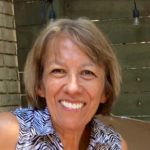 Estela Smith is a native Texan. Born and reared in Dallas. Estela and her husband lived on the West Coast for 35 years; now they own their home in the Cedar Ridge neighborhood of Waco. They are grateful for family in the Greater Dallas area and in Austin.
Estela Smith is a native Texan. Born and reared in Dallas. Estela and her husband lived on the West Coast for 35 years; now they own their home in the Cedar Ridge neighborhood of Waco. They are grateful for family in the Greater Dallas area and in Austin.
One of her favorite quotes is, “If you want to lift yourself up, lift up someone else.” (Booker T. Washington) Contributions and edits courtesy of A. Neish, past president, National Assistance League.
By Ashley Stephens
The main focus of the Children’s Garden and Outdoor Classroom is to offer children and adults the opportunity to connect with and learn about gardening, nature, and sustainability. The Children’s Garden and Outdoor Classroom offers ongoing gardening and outdoor classes for children, workshops for adults, and community events.
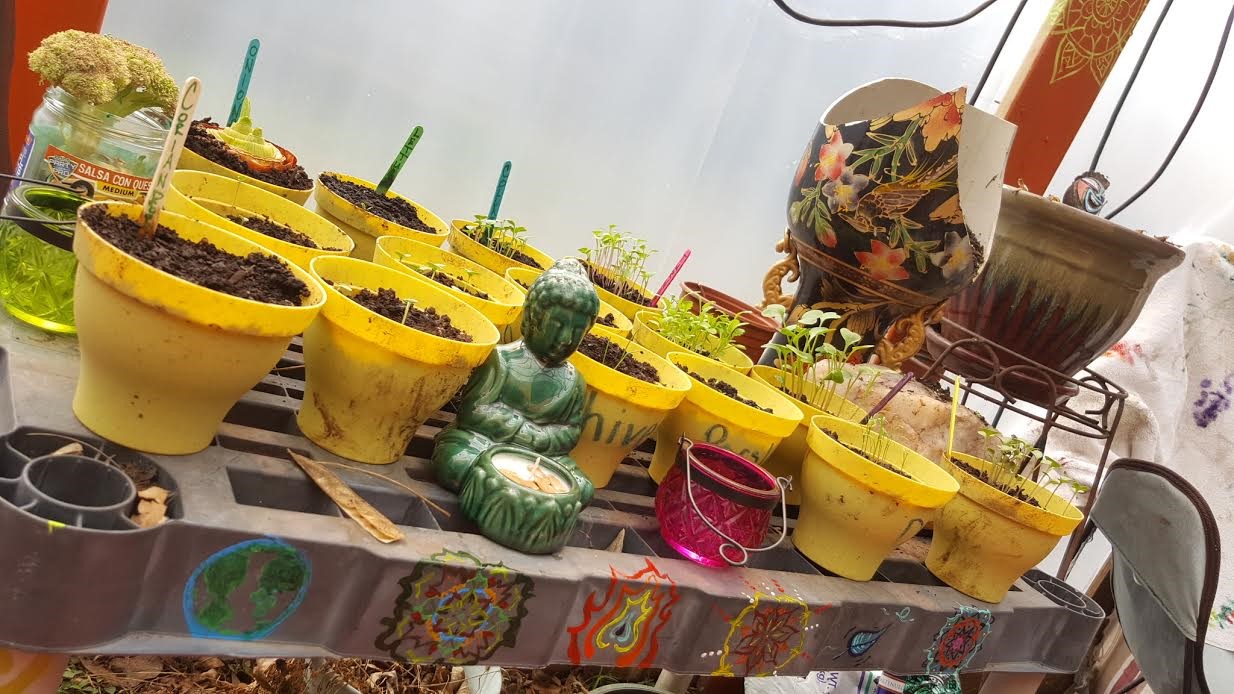 I started the Children’s Garden and Outdoor Classroom in Fall of 2015 after not finding anything like it available locally for my son that I homeschool. We enjoyed gardening at home but he wanted to garden and learn with friends. More and more public and private schools are getting gardens, gardening classes, and clubs but there wasn’t a place homeschoolers or those without access to a garden could go for that. I envisioned more than just a “community garden” where people garden plots independent of each other, but instead a garden that brought people together to learn, grow, explore, make new friends, and play on a regular basis.
I started the Children’s Garden and Outdoor Classroom in Fall of 2015 after not finding anything like it available locally for my son that I homeschool. We enjoyed gardening at home but he wanted to garden and learn with friends. More and more public and private schools are getting gardens, gardening classes, and clubs but there wasn’t a place homeschoolers or those without access to a garden could go for that. I envisioned more than just a “community garden” where people garden plots independent of each other, but instead a garden that brought people together to learn, grow, explore, make new friends, and play on a regular basis.
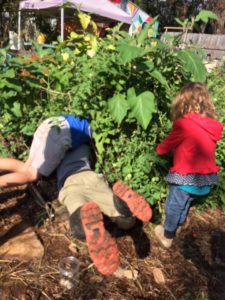 The garden and the outdoors in general are the perfect place for anyone, especially children to learn life-long skills, natural sciences, and build confidence in their ability and place in the natural world. I started with homeschool classes because I homeschool, but now I offer a preschool “lil sprouts” class, an after school club and a lot of the parents attend the class with their children too, so it really has become something for the whole community.
The garden and the outdoors in general are the perfect place for anyone, especially children to learn life-long skills, natural sciences, and build confidence in their ability and place in the natural world. I started with homeschool classes because I homeschool, but now I offer a preschool “lil sprouts” class, an after school club and a lot of the parents attend the class with their children too, so it really has become something for the whole community.
Some of the families that attend The Children’s Garden and Outdoor Classroom have acres of land, with animals, and a big garden. They come because they want to learn more, share what they know, and connect with others with similar interest. Some of the families that attend The Children’s Garden and Outdoor Classroom live in apartments in Waco with no yard at all. They attend because they want their children to still get to have wonderful outdoor experiences in the garden picking vegetables, caring for chickens, and hiking in the woods. A lot of the families fall somewhere between the two. I love the mix of families that attend classes and the community it creates.
What type of programs do we offer?
The Children’s classes are divided in sessions in the fall and spring. Each class meets once a week for 6-12 weeks. We also offer short summer and winter day camps for children. The garden has raised gardening beds, a fairy garden, a wildlife garden, compost bins, a key hole garden, chicken coop, worm composting bin, a play area with an awesome tree house that the children enjoy every class.
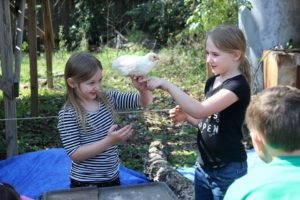 This past spring we offered a four hour nature school for homeschoolers. In this class we hiked in the woods and explored local plants and animals, read stories, and journaled our new discoveries, then had lunch in the park, after which headed over to the garden where we planted, watered, and harvested the garden, made garden fresh snacks like pizza, salsa, and hand cranked ice cream, cared for our chickens, harvested honey, made cob fairy houses, and learned about composting.
This past spring we offered a four hour nature school for homeschoolers. In this class we hiked in the woods and explored local plants and animals, read stories, and journaled our new discoveries, then had lunch in the park, after which headed over to the garden where we planted, watered, and harvested the garden, made garden fresh snacks like pizza, salsa, and hand cranked ice cream, cared for our chickens, harvested honey, made cob fairy houses, and learned about composting.
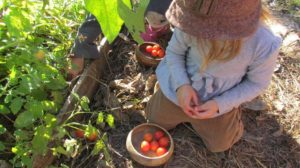 We also offered a one hour”lil sprouts” gardening class for ages 3-5 and their caregiver and an after school gardening club so children that attend school are able to partake in classes as well. In these classes we did some of the same garden activities as the nature school class does. The Children’s Garden and Outdoor Classroom also has put on workshops for adults like basic gardening and learning how to make sauerkraut and beeswax candles. This spring we hosted a community MLK Day of service with the Urban Garden Coalition, a Spring potluck, and a George Washington Carver Story in the Garden.
We also offered a one hour”lil sprouts” gardening class for ages 3-5 and their caregiver and an after school gardening club so children that attend school are able to partake in classes as well. In these classes we did some of the same garden activities as the nature school class does. The Children’s Garden and Outdoor Classroom also has put on workshops for adults like basic gardening and learning how to make sauerkraut and beeswax candles. This spring we hosted a community MLK Day of service with the Urban Garden Coalition, a Spring potluck, and a George Washington Carver Story in the Garden.
Where is the Children’s Garden and Outdoor Classroom?
It’s located at 100 N Oak in Lorena, TX, just outside of Waco. We are in the very big backyard of the business Enchanted Cedar who graciously allow us to use the space. We are one block away from Lorena’s McBryer Park and hiking trails.
What keeps me going?
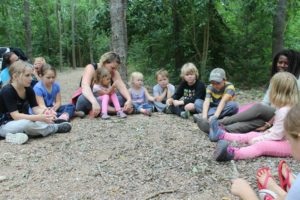 I want all families to know how easy gardening can be and the many benefits it offers to both children and adults. You not only get fresh organic vegetables but also children that are eager to eat them. It’s the easiest way to adopt a healthy lifestyle. There are so many lessons that can be taught through gardening with little effort, you just pick up on them naturally caring for and watching the garden grow. You also get all of the mental and physical health benefits science shows of being immersed and connected to nature and in our busy world that can be very important. In the two years I have been leading classes at The Children’s Garden and Outdoor Classroom I have learned so much from the garden, children, and parents. I’m excited to see what new things the garden has in store. I want to inspire our community to garden, hike, and enjoy the outdoors more in their daily lives.
I want all families to know how easy gardening can be and the many benefits it offers to both children and adults. You not only get fresh organic vegetables but also children that are eager to eat them. It’s the easiest way to adopt a healthy lifestyle. There are so many lessons that can be taught through gardening with little effort, you just pick up on them naturally caring for and watching the garden grow. You also get all of the mental and physical health benefits science shows of being immersed and connected to nature and in our busy world that can be very important. In the two years I have been leading classes at The Children’s Garden and Outdoor Classroom I have learned so much from the garden, children, and parents. I’m excited to see what new things the garden has in store. I want to inspire our community to garden, hike, and enjoy the outdoors more in their daily lives.
Upcoming Events:
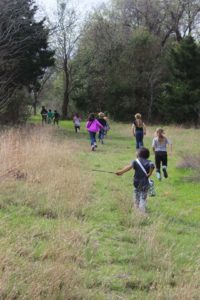 Sauerkraut Make and Take Workshop: June 4th 3pm. Learn to make lacto fermented Sauerkraut and the health benefits of fermented food. Make your own custom sauerkraut to take home
Sauerkraut Make and Take Workshop: June 4th 3pm. Learn to make lacto fermented Sauerkraut and the health benefits of fermented food. Make your own custom sauerkraut to take home
Art in Nature Day Camp June 12 – June 14 9 am – 1pm
Activities include using nature and natural material to paint, sculpt, draw, and craft along with plenty of gardening, hiking, animal care, snack making, and more. For children attending with a parent or guardian this will be a donation based event. There are a limited amount of drop off spots available.
You can find out more about upcoming event, register, or contact the garden:
https://www.facebook.com/childrensgardenandoutdoorclassroom/
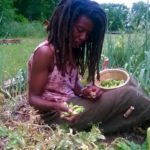 Ashley Stephens lives in Lorena Tx with her son Ajoni and their chickens, ducks, and bees. She homeschools, runs the Children’s Garden and Outdoor Classroom, and works at the Waco Downtown Farmers Market. She loves to garden and backyard homestead. She studied Horticulture and Agriculture at Central Texas College, has a Permaculture Design Certificate, and is a McLennan County Master Gardner intern.
Ashley Stephens lives in Lorena Tx with her son Ajoni and their chickens, ducks, and bees. She homeschools, runs the Children’s Garden and Outdoor Classroom, and works at the Waco Downtown Farmers Market. She loves to garden and backyard homestead. She studied Horticulture and Agriculture at Central Texas College, has a Permaculture Design Certificate, and is a McLennan County Master Gardner intern.
